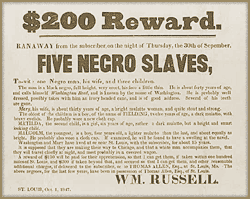







 |
 |
 |
 |
 |
| |
Why did enslaved people run away?
Enslaved people ran away for many reasons. Slavery was very cruel. The life of the enslaved was not a happy one. Many enslaved people were beaten and tortured. Often enslaved families were torn apart when the members were sold to different owners. Some enslaved people did not have enough to eat, warm clothes, or a decent place to live. Sometimes enslaved people ran away because they were going to be sold. Enslaved people especially dreaded being "sold South" because life further south was even harder than life in Maryland. Sometimes whole families fled together to avoid being separated.

When enslaved people ran away, their owners would offer large sums of money for their return, making it even more difficult for the escaped to find safe places to hide.
|
Many enslaved people wanted to be free so they could develop their own talents and make some money of their own. They wanted to be free to live where they chose, to get an education and, especially, to stay with their families. Even those enslaved who were well treated, who had enough to eat and did not receive beatings, wanted to be free.
You can read many stories about why enslaved people ran away. One person, William Still wrote about the escapes of some enslaved people. His house in Philadelphia was a central station on the Underground Railroad route to freedom. This free black man, whose mother had come from Maryland, received many fugitives. He kept records of all the people who passed through his home as passengers on the Underground Railroad. You can read excerpts from William Still's diary. As you read, remember that people wrote and spoke a bit differently in the 19th century.
What kind of people worked with the Underground Railroad?
« back to About home
|
|
 |
 |
 |
|
 |
|










